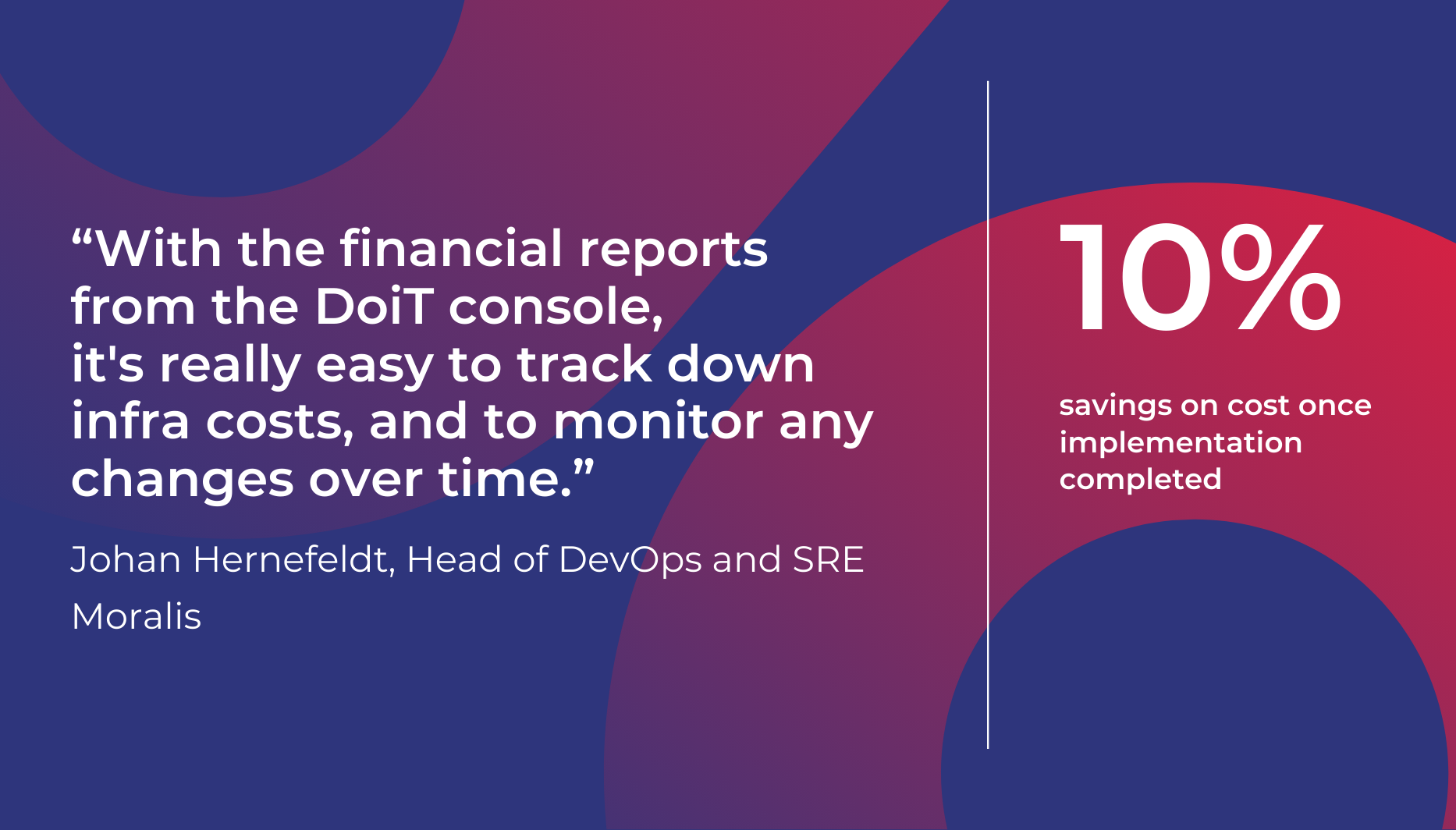
How Rapyd solved observability gaps to cut Kubernetes costs by 40%
Learn how Rapyd overcame observability limits with PerfectScale by DoiT to cut Kubernetes costs and boost app stability.
View all DoiT Cloud Intelligence features
Insights, tips and perspectives from cloud experts
Foundational expertise and future-ready recommendations
In-person and virtual tech talks
Meet the team leading DoiT
Hear what’s new at DoiT
Unlock revenue through expert partnerships
Discover career opportunities
Award-winning partners of cloud providers


Moralis offers enterprise-grade APIs and real-time blockchain data to make Web3 development easy. As a platform, it’s designed to streamline and simplify the development of decentralized applications (dApps) and Web3 projects, enabling developers to go-live within days, instead of months. By providing a comprehensive suite of backend tools, Moralis allows developers to focus on creating engaging and robust user experiences without worrying about complex infrastructure management. The Moralis Academy also runs courses to help educate and grow the Web3 community. “It’s about democratizing access to financial services,” says Johan Hernefeldt, Head of DevOps and SRE at Moralis.
After migrating to AWS, Moralis wanted to build on its partnership with the platform, and looked to DoiT for additional partner-led support. “When we started out, we didn’t need much support, because the initial migration was straightforward,” says Hernefeldt. But once AWS was embedded, Moralis found it had multiple issues with running its databases in the new environment.
Moralis also had several unoptimized workloads. One of its major workloads was running Citus on Amazon EC2, at a significant cost. Moralis engaged with DoiT to help streamline its spend.
DoiT planned several sessions for the Moralis team with DoiT’s expert Cloud Reliability Engineers to conduct architecture, cost optimization and security posture reviews – in order to achieve Moralis’s goals of rearchitecting and optimizing its workloads. Those discussions helped identify opportunities to elevate Moralis’s infrastructure, aligning it to industry best practices for reliability and disaster recovery, addressing core DNS issues, and managing traffic in a way that minimizes network hops.
Moralis has already adopted several of DoiT’s recommendations, such as backup strategies and multi-region capabilities. “From the infrastructure side, we want to have as high reliability as possible, so more improvements are in store,” says Hernefeldt.
In order to set its AWS account up for AWS Foundational Technical review, Moralis created multiple new accounts to deploy its workloads. But it got capped at 32 CPU or 64 CPU, and its clusters of workloads were above that. “Getting increased quota requests on new accounts is very tricky, but since onboarding with DoiT, these types of requests go through very quickly,” says Hernefeldt.
Moralis received dedicated expertise from DoiT in its migration from Citus to S3 and Dynamo – a product that Hernefeldt described as ideal for blockchain data, as it is a time series database. But the technology was new to Moralis.
“We used S3 before, but never Dynamo,” says Hernefeldt, “so being able to pull in experts to ask for best practices and different pitfalls to try to avoid was really helpful. As we started to use it, we ran into some issues that were hard to predict and being able to raise support tickets and get someone online to hop in a meeting with us to analyze it was really helpful.”
As a result of DoiT’s expertise, Moralis has been able to spot opportunities to drive better efficiencies from their cloud infrastructure investments to support their business goals. Since using Flexsave, Moralis has seen cost savings of 10%. “We missed some configuration when our NAT gateways were set up, so our traffic was bouncing up through the internet and back in again,” says Hernefeldt. “We got some help to set it up so that all traffic will be AWS internal, which saved us a nice bit of infrastructure cost.”
DoiT has also helped Moralis to set up custom reports with overviews of its infrastructure cost. “Normally, when you look at the billing page in the management accounts, you see everything aggregated and you have to dig into different accounts for a better view,” Hernefeldt observes. “With the financial reports from the DoIT console, it’s really easy to track down infra costs, and to monitor any changes over time. You can drill down per account or product and see where the cost is going. That really helped us to figure out that we were paying a lot extra for the network routing – and reduce that excess cost.”
Alongside cost optimization, Moralis has benefited from recommendations from DoIt on using key features with EKS – for instance, annotations that keep pods together inside the availability zone, so even if they are spread out, those that need to can be grouped together, minimizing network jumps.
Moralis is using its learnings to continue to build on its mission of Web3 growth, adding new features, additional blockchains, and improved data handling. “We’re adding more chains and features to our API, while simplifying existing workflows,” says Hernefeldt, “making it even easier to use our products.”

Learn how Rapyd overcame observability limits with PerfectScale by DoiT to cut Kubernetes costs and boost app stability.

Facing challenges in listing its VPN solution on AWS Marketplace, OpenVPN turned to DoiT. With expert guidance and strategic support, OpenVPN streamlined the process, optimized licensing, and accelerated its go-to-market success.
DoiT saves ApparelMagic two months of development time building its image-generation tool
From cost optimization to cloud migration, machine learning and CloudOps,
we’re here to make the public cloud easy.
From cost optimization to cloud migration, machine learning and CloudOps, we’re here to make the public cloud easy.
Ready to get started?
You will receive a calendar invite to the email address provided below for a 15-minute call with one of our team members to discuss your needs.